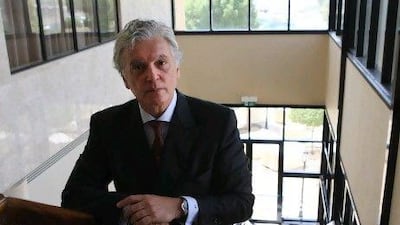This week Herbert Smith, an international law firm, hosted a roundtable discussion on power and infrastructure opportunities in Egypt at the Intercontinental Hotel in Abu Dhabi.
The aim was to bring together project sponsors, government officials, and financiers to determine what opportunities might be available in the country.
Chairing the event was Karim Helal, who is a board member of CI Capital, an Egyptian investment bank, and the chairman of the Asean Egyptian Business Association. He describes himself as a "banker turned scuba-diver turned banker" because of his twin passions for finance and diving.
At 62, he has worked in the Gulf, the Far East, London and Cairo, where he is now based. He spoke to The Nationalafter the roundtable meeting on the need for and risks of long-term investing in Egypt.
Give us the background to Egyptian infrastructure investment?
Egypt has suffered under totalitarian regimes for 60 years, people say it's 30 years but in fact it started under Nasser. They always say the road to hell is paved with good intentions. With good intentions he made education free for everybody. But the problem is that it is not free, Egyptians pay more than 10 billion Egyptian pounds [Dh6.16bn] every year educating their children, and not really getting a proper education at that. Then graduates were guaranteed a government job creating huge disguised unemployment and effectively planting the seeds of the administrative corruption that we see today. Education, along with health care, ate [into] crucial areas that Egypt needs to seriously overhaul and that represent additional investment opportunities in the broader infra structure space with power, roads, ports etcetera, just think of an 80 million-plus population growing by 2 per cent a year.
But hasn't there been quite a lot of foreign investment over the years?
Yes there has, it's true, but the problem is that it didn't trickle down fast enough or wide enough in the sense that while the macro-economic indicators were showing positive and continuous growth, the average person in the street was feeling and getting poorer.
What is the mood in Egypt like now?
Everyone saw what happened, and how quickly Mubarak was got rid of. It took just 18 days. But it was always going to take longer, I mean years, to readjust the DNA of a nation and to rebuild the economy to achieve sustainable growth with a strong tint of social justice.
The revolution was spontaneously ignited by the youth having brought down the 60-year-old wall of fear-imposed silence, demanding freedom, democracy, dignity, end to corruption etcetera. But in my view the real underlying catalyst that galvanised the masses in the millions that we all saw, which turned the youth uprising into the tumultuous event that it became, were everyday economic hardships, namely inflation, poverty, unemployment and an almost complete lack of prospects. The young were deprived of their ability to dream of a better future.
The path forward, whatever its political orientation, can only have one option: tackle these core problems by creating productive jobs to achieve sustainable GDP growth. We have nearly 700,000 graduates coming into the job market every year. A major improvement and expansion in our infrastructure is a must.
What size of investment does Egypt need and in which areas?
People at the roundtable were saying that it needs up to US$40 billion [Dh146.9bn] over the next 10 years. There is also the need for more roads, water connections, water treatment plants, bridges and other things.
Is this money going to come from the private sector or from governments and multilateral agencies?
There is a lot of interest from the private sector, although they have concerns. They want to be sure existing contracts are honoured, they are worried about currency risk and government guarantees.
Multilateral agencies - and we had representatives from the African Development Bank - said they would like to be seen as complementary, not as substitutes to the private sector.
What are their other concerns?
Obviously they are worried about political risk. But I tell them not to worry about this. It's true that elections have been delayed, but whoever is in government, they will have to focus on one thing: the economy.
So what are the opportunities?
Egypt is a big country, with 80 million people. We need economic growth. It can only get this through infrastructure spending, not just physical things but also health care and education. But that spending will help boost GDP. There is a lot of potential. Because of the size of the population we can tap into its pockets. There isn't much of a bond market now, but we could create one that would be very helpful. Bear in mind this is going to be a long-term project. As I said, if you want a short-term deal, plant a flower. If you want a long-term lasting investment, plant a tree.
What are the role models? Where do you think this has been done successfully?
I always say Turkey and Malaysia. If you look at what Turkey has done over the past 20 years it is phenomenal. Twenty years ago Egypt was probably ahead of Turkey, but that has changed. We are a similar size with a similar population and the same kind of habitat. Erdogan came to Egypt a few weeks ago and was greeted like a hero. We can see the possibilities.
And interest from the Gulf?
Yes, of course, although, like other investors, they are also concerned about the currency risk. But one thing they have more than people from other parts of the world: they feel at home. One investor from the Gulf today told me that he feels that Egypt is his home market.

